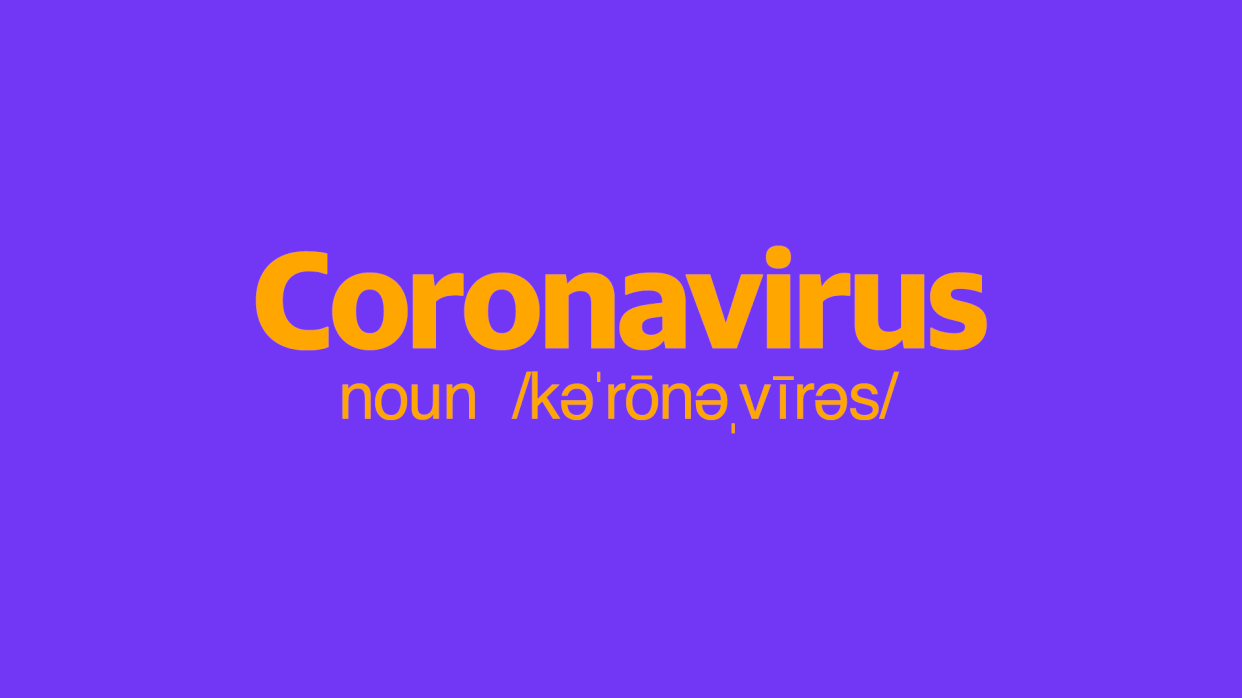Confused about the coronavirus? This glossary will help

As the world braces for the continued spread of the coronavirus, rarely-before used terms like “pandemic,” “incubation period” and “quarantine” have solidified their place in our global conversation. Understanding these words — which are now ubiquitous on social media and in daily conversations — is crucial. But if the strange new vocabulary is making your head spin, you’re not alone. Here to help is a simple-to-use glossary of the words you need to know.
A
Antibodies
Specific proteins created by the immune system to fight off an infection.
Antibody test
A blood test used to locate specific antibodies that determine whether or not an individual has been exposed to a virus.
C
Chloroquine
An anti-malarial drug. Early research suggests that a similar medication, hydroxychloroquine, may be helpful in lessening the symptoms of COVID-19 — but experts say more research is needed.
Clinical Trial
A study in which participants try out new treatments, therapies or other interventions to help make advancements in the medical world.
Community spread
Confirmed cases of a virus with unknown origin, meaning they cannot be traced to a close contact or a traveler. Multiple states in the U.S. have reported high rates of community spread, including Washington, New York, California and Massachusetts.
Contact tracing
The process of interviewing every patient with a virus to determine who else they may have come in contact with — then testing those individuals to see if they are carrying the virus.
Containment strategies
Policies or actions used to contain something dangerous (e.g. COVID-19). Federal and local officials have enacted containment strategies that include travel restrictions and — in New York — a one-mile “containment zone” in which residents must remain within the limits of the designated area.
Coronavirus
A family of viruses, named for their crown-like spikes, which can cause mild to severe respiratory illness (e.g. Middle-East respiratory syndrome or MERS; Avian flu).
COVID-19
A new disease caused by the virus SARS-CoV-2 which may cause a mild to severe respiratory illness including dry cough, fever, shortness of breath and fatigue. Some reports show that COVID-19, in some individuals, may produce no symptoms.
D
Defense Production Act
A bill, invoked by the U.S. president on Wednesday, which allows private companies to increase the production of vital supplies and equipment such as masks, ventilators and gloves.
E
Epidemic
The widespread outbreak of an infectious disease. Past epidemics include the 2009 swine flu epidemic, the 2014 Ebola epidemic, and the 2019 measles outbreak in the Democratic Republic of Congo.
Epidemiologist

Experts who investigate the spread of infectious disease, including causes, risk factors, frequency, patterns and populations. While some epidemiologists work as academics or leaders in health departments, others operate in the field, flying into regions where a new disease has erupted.
Essential worker
A phrase used to describe individuals whose work has been deemed “essential” by state and federal governments. In the U.S., essential workers include health care professionals, grocery store clerks, pharmacists and public transportation workers.
F
Flattening the curve
Using containment and mitigation strategies to slow the spread of disease in order to avoid a scenario in which health care facilities are over-capacity and supplies are scant.
H
Happy hypoxia
A phenomenon in which individuals with extremely low levels of oxygen seem to show no symptoms of the life-threatening condition. Some doctors also refer to this as “silent hypoxia.”
Hydroxychloroquine
An anti-malarial drug taken by people with lupus and rheumatoid arthritis to reduce flare-ups. Early research suggests that it may be effective in lessening the symptoms of coronavirus, but experts say more research is needed to make that determination.
I
Incubation period
The amount of time a person carries a virus before showing symptoms. The most recent research suggests that for the coronavirus, this is 2-14 days, with an average of 5 days.
Intensive Care Unit (ICU)
Also known as a trauma center, this is a specific portion of the hospital designated for the treatment of patients who are acutely ill.
Immunocompromised
An immune system that is weakened or impaired, meaning its ability to fight off infection may be more limited. The condition can be caused by viruses (such as HIV) or certain genetic disorders.
Isolation
Used to describe a medical quarantine for patients who have tested positive for a virus.
M
Mitigation strategies
Preparations that health officials and community members can take to help mitigate, or lessen the impact, of disasters (in this case, a viral pandemic). Examples include formulating household plans, canceling faith services and keeping up with the latest information from the CDC.
O
Outbreak
A sudden, often unexpected rise in something harmful (e.g. disease, war, panic).
P
Pandemic

An epidemic that has gone global, spreading across every continent.
Paycheck Protection Program (PPP)
A federally-funded small business loan aimed at keeping companies in the U.S. afloat during the coronavirus pandemic.
Personal Protective Gear (PPE)
The term for clothing, gloves, masks and other equipment that health care workers and others wear to minimize exposure to pathogens or other hazards
Plaquenil
The brand name for hydroxychloroquine, an anti-malarial drug that is being explored as a treatment option for patients with COVID-19.
Q
Quarantine
The act of intentionally remaining in one place to prevent infection or the spread of infection.
R
Remdesivir
An anti-viral medication, used in the treatment of Ebola, that is being tested as a possible treatment for COVID-19.
Respirator

A tight-fitting mask — such as the N95 — that is sealed to the face and protects against 95 percent of airborne particles, both large and small.
S
SARS-CoV-2
The official name for a new virus that first appeared in Wuhan, China that may cause a range of respiratory symptoms including dry cough, fever, shortness of breath and fatigue.
Serological testing
See: Antibody testing
Shelter-in-place
A rare, often mandatory order that requires individuals to remain at home unless obtaining basic necessities (like food, medicine) or receiving/conducting medical care. Exceptions, such as the ability to go on a walk for exercise, vary by location.
Social distancing
Keeping a distance of six feet or more from strangers to prevent the spread of disease and limiting frivolous activities such as social gatherings and unnecessary travel.
State of emergency
Either state or local declaration that allows government officials to bypass laws, release funds and galvanize both citizens and medical staff.
Stealth transmission
The spread of a virus through an asymptomatic person — meaning someone who has no symptoms, or extremely mild symptoms.
Surgical mask
A loose-fitting, disposable mask used to protect health workers and sick people from spreading disease through large airborne particles.
V
Vaccine
A dead or weakened form of a virus that allows the body to create immunity against it.
Ventilators
A medical device that provides a patient with oxygen.

For the latest news on the evolving coronavirus outbreak, follow along here. According to experts, people over 60 and those who are immunocompromised continue to be the most at risk. If you have questions, please reference the CDC and WHO’s resource guides.
Read more from Yahoo Lifestyle
Worried you're experiencing coronavirus symptoms? Here's what the CDC says to do
Coronavirus and immunocompromised kids: 'Where does this leave children like mine?'
Want daily pop culture news delivered to your inbox? Sign up here for Yahoo Entertainment & Lifestyle's newsletter.

